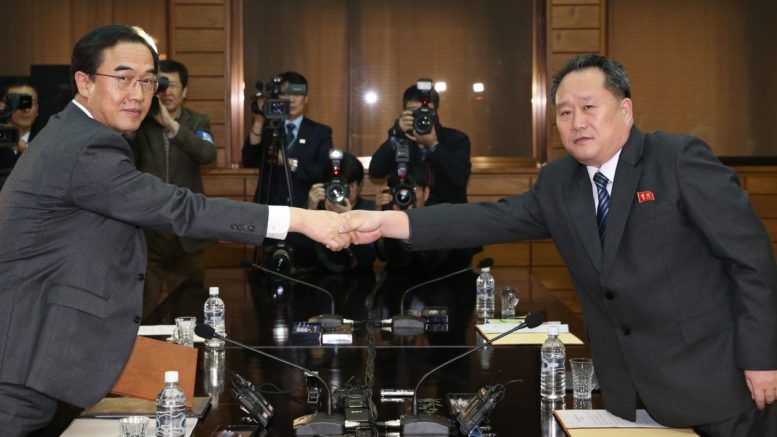The leaders of North and South Korea have agreed to hold a summit at a village on the border between the two countries on 27 April, only the third-ever such meeting and another sign of a thaw in relations.
Senior officials of the two Koreas met on Thursday to prepare for a rare inter-Korean summit, days after the nuclear-armed North’s leader Kim Jong-un made his international debut with a surprise trip to China.
Kim is due to meet South Korean President Moon Jae-in late April at the truce village of Panmunjom in the demilitarized zone, followed by landmark talks with US President Donald Trump which could come as early as May.
Kim Jong-un paid ‘unofficial’ visit to Beijing, Chinese state media confirms
Read more
At the Unification Pavilion on Panmunjom’s northern side, the leader of Pyongyang’s delegation Ri Son Gwon said Thursday’s talks were aimed at paving the way for a meeting between the leaders of North and South – the first direct public reference to a summit by any Northern official or media outlet.
“Over the past 80 days or so, many events that were unprecedented in inter-Korean relations took place,” said Ri, who is chairman of the North’s reunification committee.
The rapid rapprochement on the peninsula was kicked off by the Winter Olympics in the South and comes after a year of heightened tensions over the North’s nuclear and missile programmes, which saw Kim and Trump engage in a fiery war of words.
Events have moved quickly since then, with a flurry of official visits between the Koreas and an advance team of Southern performers heading north on Thursday before K-pop concerts in Pyongyang.
Analysts say the success of an inter-Korean summit will depend on the likelihood of talks between North Korea and the US. No date has been set for a meeting between Trump and Kim.
Advertisement
For North Korea, diplomacy towards the south is a route to talks with the US, and part of a long-term effort to lower economic sanctions levied on the country, according to Christopher Green, senior adviser for the Korean peninsula for Crisis Group, a conflict-prevention organisation.
“If there is reasonable chance of talks with the US going ahead, that will help the inter-Korean summit go well because the North Korean side will want to show a convivial side,” Green said.
The summit could pave the way for broader multi-party talks in the region. “If everything goes smoothly, there will be following rounds of two-party, three-party, or four party summits,” said Cheng Xiaohe, an associate professor at Renmin University’s school of international studies in Beijing.
“No one expects the Korean peninsula issue to be settled by one or two rounds of summits. There’s a long way to go. But the overall trend is positive.”
Also on Thursday, China’s top diplomat, Yang Jiechi, was due in Seoul to brief Moon on Kim’s secretive visit to Beijing to meet Chinese President Xi Jinping for the first time.
0:43
North Korea’s Kim Jong-un meets with China’s Xi Jinping – video
It was the North Korean leader’s first overseas trip since inheriting power after the death of his father, Kim Jong-il, in 2011.
China has long been the North’s key diplomatic defender and provider of trade and aid, but relations have been strained by Pyongyang’s weapons programmes, with Beijing showing a new willingness to implement UN sanctions against it.
Even so the two leaders hailed their nations’ historic ties, with Xi accepting Kim’s invitation to visit Pyongyang, according to the North’s official Korean central news agency.
“There is no question that my first foreign visit would be to the Chinese capital,” it quoted Kim as saying, calling it a “noble obligation”.
Kim pledged he was “committed to denuclearisation” on the Korean peninsula, according to China’s Xinhua news agency – but added this would depend on South Korea and the US taking what he called “progressive and synchronous measures for the realisation of peace”.
Analysts say both sides had reason to hold the meeting – Pyongyang to secure Beijing’s backing and support, and China to protect its interests in what it considers its backyard.
Robert Kelly, a professor at Pusan National University in South Korea, said: “Xi would not grant this meeting unless the Chinese were genuinely concerned about the summits to come and wanted some kind of role to play.”
Still, it’s unclear how committed Kim is to denuclearisation. “The Kim statement on denuclearisation came with preconditions that sound very similar to the preconditions that caused previous talks to fail,” said Douglas Paal, head of the Asia program at the Carnegie Endowment for International Peace, in Washington DC.
“It may be Kim’s definition of the preconditions has changed, but that understanding can only come through careful negotiations. We should take his statement seriously, but with considerable skepticism.”
After years of military provocations and economic decline, North Korea’s recent overtures to South Korea, China, and the United States are signs the isolated country may be entering a period of re-engagement and diplomacy over the long term.
“North Korea is in this for the long haul,” Green said. “It’s more than willing to give this diplomacy two or three years, not just two or three months.”
AFP and Reuters contributed to this story
Since you’re here …… we have a small favour to ask. More people are reading the Guardian than ever but advertising revenues across the media are falling fast. And unlike many news organisations, we haven’t put up a paywall – we want to keep our journalism as open as we can. So you can see why we need to ask for your help. The Guardian’s independent, investigative journalism takes a lot of time, money and hard work to produce. But we do it because we believe our perspective matters – because it might well be your perspective, too.
I appreciate there not being a paywall: it is more democratic for the media to be available for all and not a commodity to be purchased by a few. I’m happy to make a contribution so others with less means still have access to information.
Thomasine, Sweden
If everyone who reads our reporting, who likes it, helps fund it, our future would be much more secure. For as little as €1, you c

